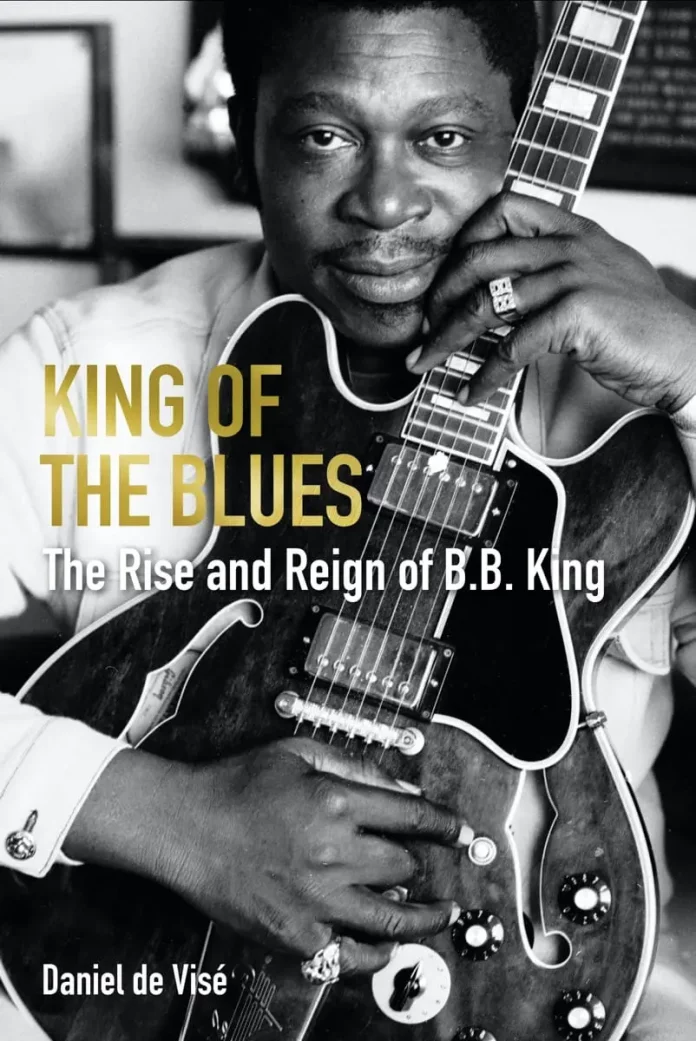Is B.B. King the undisputed King of the Blues? Well, in terms of career longevity, music recorded, shows performed, countries toured, impact on post-war electric guitar playing and awards received, it would be difficult to argue against the man and his throne.
But the blues covers a very long period and B.B. King’s popular success was primarily from the 1950s onwards; and his style of blues was principally urban, moving towards R&B as he got closer to the 1960s. Whilst brought up in the Deep South, King was not especially interested in the music of Charlie Patton, Robert Johnson and his country-blues contemporaries. He preferred the virtuosity of performers like Lonnie Johnson, T Bone Walker and Django Reinhardt. King had an eye to the future and not the past.
In many ways Riley (later to be known as B.B.) King had the stereotypical upbringing of many blues musicians. He was born into relative poverty, he lost his mother at an early age, his father was absent, he was brought up by the extended family, he worked on the land, and he got his break to play the guitar at a young age.
The radio was his great source of inspiration, and the church provided the opportunity to play and sing. When he got the chance to escape, he headed for Memphis and a career on the chitlin’ circuit. What King had in abundance was the determination to succeed, self-belief, charm, a bit of luck and lot of talent. What he also had in abundance was an addictive personality that would blight periods of his career and personal life.
This is a biography about the man as much as his music and De Visé’s biography does not always make comfortable reading. Whilst he is quick to record King’s many successes in a long and unprecedented career, De Visé is not afraid to contradict King’s own account of his life where the claims simply cannot be reconciled with the evidence. Nor is he slow to analyse the many poor recording choices and personal mistakes committed by King in his often-turbulent career.
King hated conflict and was over-trusting of others. Consequently, he failed to make the right decisions for fear of the consequences; relying on others to make them for him. Often that trust in others was misplaced and King suffered more than his fair share of record company and management betrayals. King’s use of women for after-show casual sex would be seen as offensive by many and his addiction to gambling would result in lost fortunes, the need for relentless touring and the constant attention of the IRS.
To his credit, King was financially generous to his many children, who seemed to have few boundaries when it came to asking for handouts. De Visé asserts that King was probably impotent from an early age and incapable of fathering his own children. Why he accepted paternity in respect of over a dozen illegitimate children without any proof remains a mystery. One can only speculate it was to have the family he never had as a child. On his death in 2015, his children fought an acrimonious battle over his estate which has not yet concluded.
This stands head and shoulders above the majority of musical biographies in terms of its research and its analysis; it’s certainly the best on King’s life and career to date. It is well written, musically articulate and makes for absorbing reading. I was surprised by many of the things I read about King on a personal level but could not help but conclude that, despite his many flaws, King’s contribution to the legacy of blues music will be difficult to beat. His greatest contribution is probably now the least noticed, namely the development of a technique to play the guitar like a human voice. It is now so commonplace that to attribute it to one man now seems preposterous. Whether that makes him the king of the blues is perhaps too simplistic. I prefer the analogy that B.B. King “represented the blues as Louis Armstrong once represented jazz, a single performer who could nevertheless stand, and speak for the whole genre”. (The Guardian) and there probably is no greater compliment than that. Highly recommended reading.
King Of The Blues: The Rise And Reign Of B.B. King by Daniel de Visé. Grove Press UK, 481pp, hb, £20. ISBN 9781611856545.
















